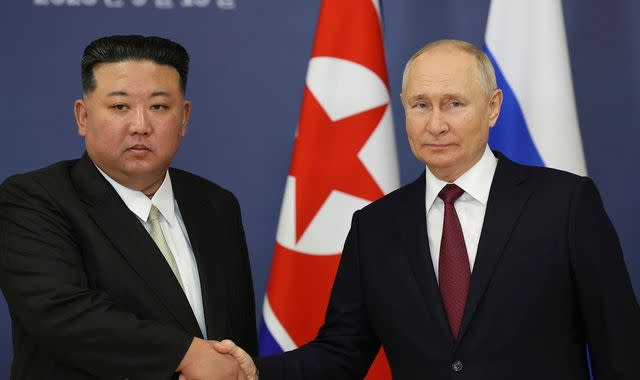Putin's visit to North Korea is a very much a diplomatic two-fingers to the West

This will only be Vladimir Putin's second visit to North Korea.
The first was soon after he assumed office in 2000, nearly a quarter of a century ago.
That's a long time to wait for a return trip. Was it the hospitality? Or did he just have better options elsewhere?
Either way, it's very much a case of beggars can't be choosers right now, with Tuesday's visit highlighting both Russia's isolation from the West and the blossoming friendship between these two pariah states.
What does North Korea offer Russia? A lot more than camaraderie. According to the US and others, it's supplying the Kremlin with weapons and ammunition to use in Ukraine.
In an interview with Bloomberg recently, South Korea's defence minister said the North had sent nearly five million artillery shells to Russia since September, as well as dozens of ballistic missiles.
Moscow and Pyongyang both deny the accusation but UN monitors claim to have seen evidence. In January, they concluded the remnants of a missile fired from Russia on Kherson was that of a North Korea-made Kwasong-11 series.
Kyiv claims there are several more examples.
For North Korea, the closer ties are a big win. As well as food and fuel, analysts say Russia has provided the poverty-stricken nation with much-needed economic aid and diplomatic support.
In March, for example, Russia vetoed the UN resolution to renew the mandate of the panel of experts monitoring sanctions enforcement.
It's also assumed Moscow is supplying some technical know-how for Pyongyang's space and satellite programmes, after President Putin hosted Kim Jong Un at the Vostochny Cosmodrome in Russia's far east last September.
The stronger ties between the two is a major concern for the West and its Asian allies.
Read more world news:
17 dead after two shipwrecks off Italian coast
Body of American man found on Greek island
Germany seizes 35.5 tonnes of cocaine
These are two leaders who like to warn how their fingers are poised over the red button. The primary fear in Washington and Seoul is that Russia could start supplying some of its nuclear know-how and missile technology, on top of the other assistance.
The Russian leader's entourage for the visit certainly raises eyebrows. It includes his new defence minister Andrei Belousov as well as Denis Manturov, the deputy prime minister responsible for defence.
The official line from the Kremlin is that there's nothing to see here - yes, we might sign a security agreement, but it won't be directed against any other country.
Russia's "right" to develop good relationships with its neighbours "should not be of concern to anyone", Kremlin spokesperson Dmitry Peskov said.
Behind the scenes, though, they will no doubt delight in the disquiet the visit is causing.
It's very much a diplomatic two-fingers to the West, which may bring tangible geopolitical benefits too.
If South Korea is considering providing weapons to Ukraine, for example, this might make them think twice about it.

 Yahoo News
Yahoo News 
